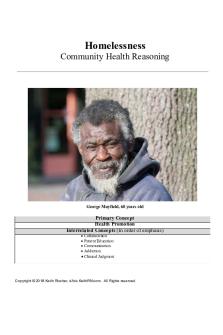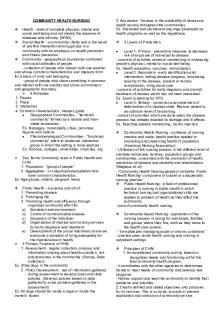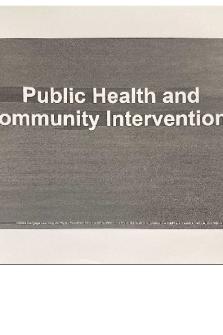Promoting motivation towards community health care- A qualitative PDF

| Title | Promoting motivation towards community health care- A qualitative |
|---|---|
| Author | ACIF ALI |
| Course | B. Sc. Nursing Post RN |
| Institution | University of Health Sciences Lahore |
| Pages | 4 |
| File Size | 135 KB |
| File Type | |
| Total Downloads | 5 |
| Total Views | 129 |
Summary
Motivation promotion ...
Description
eCommons@AKU School of Nursing & Midwifery
Faculty of Health Sciences
June 2010
Promoting motivation towards community health care: A qualitative study from nurses in Pakistan S. A. Gulzar Aga Khan University
Muhammad Shahid Shamim Aga Khan University
Ali Khan Khuwaja Aga Khan University
Follow this and additional works at: http://ecommons.aku.edu/pakistan_fhs_son Part of the Public Health and Community Nursing Commons Recommended Citation Gulzar, S., Shamim, M., Khuwaja, A. (2010). Promoting motivation towards community health care: A qualitative study from nurses in Pakistan. Journal of Pakistan Medical Association, 60(6), 501-503. Available at: http://ecommons.aku.edu/pakistan_fhs_son/2
Short Report Promoting motivation towards community health care: A qualitative study from nurses in Pakistan Saleema A. Gulzar,1 Muhammad Shahid Shamim,2 Ali Khan Khuwaja3 School of Nursing (AKU-SON),1 Family Medicine and Community Health Sciences,3 Aga Khan University, Medical Education Cell, Dow University of Health Sciences,2 Karachi.
Abstract Based on the extensive health care needs of Pakistani population, the idea of Community Health Nursing was introduced in 1985. The educational nursing institutes adopted nursing curriculum in order to produce competent nurses to meet the rising demands of society. However, very few numbers of nurses choose community health nursing as their career pathway in Pakistan. Based on the current observation, enhancing motivation among graduate nurses has always been viewed as a great challenge for the academic nursing institutions. This study was intended to explore motivating and de motivating factors in nurses towards community Health Nursing. By utilizing self concept based model of motivation, semi structured interviews were conducted with newly graduated nurses, nurse educators and nursing students. The findings revealed that certain traits, values and competencies are
Vol. 60, No. 6, June 2010
required to motivate nurses as well as to build their capacity towards working effectively in the community setting. Moreover, through this study several realistic recommendations by the participants are highlighted that could foster motivation among future nurses towards this field.
Introduction Over the years, nursing specially Community Health Nursing (CHN) has gone through a period of growth by spreading out and developing its capacity and scope1 from health care provider to health educator, researcher, planner and manager. CHN also play various roles for promotion and maintenance of health of and prevention of diseases in the communities. According to World Health Organization,2 in Pakistan, 66% of the population resides in rural areas who most of the
501
time do not have access to hospitals and Physicians. It is therefore important that nurses should be valued and encouraged to stay and work with and for community and rural areas3 which requires motivation and appreciation. There are diverse theories indicating different sources of motivation in which the extrinsic and intrinsic sources are the major ones. Extrinsic motivation proves to be the major source of motivation which includes strategies for the educator in terms of grading, providing encouragement, friendly attitude, and so forth. On the other hand, lack of closer support, appreciation and rewards are the de-motivating aspects for enhancing good learning and teaching.4 There are certain theories that have been suggested to enhance the motivation and inspiration amongst students.5 Similarly, there are also persuaded traits, values and competencies which are essential in order to practice effectively in CHN. A Self concept based model of work motivation6 comprising of traits, competencies and values are necessary to inculcate in students while preparing them to work in the field. The educators especially those who teach CHN health nursing should have the capacity to skill up these characteristics through their own professional development and continued education. To enhance the motivation in students, Braten and Olaussen7 highlighted the importance of well awareness and understanding of motivating factors among instructors and teachers. Given responses received from nursing students discovered that conversional teaching style as teaching approach has the potential to reduce the impact of many existing de-motivating factors which prevent students in performing successfully in community. This thought is also well supported by Ouzts et al.8 The possible benefits of self concept based model of work motivation6 are however, not restricted to community health nursing field. It is highly likable that selfassessed need and relevance in relation to students' motivation permeate through all specialty areas or subjects within nursing profession and other health care specialities.9 Hence broader application of the self-concept based model of motivation is possible. The self-concept is based on interaction with the environment and the experiences gained through these interactions make a person realize and develop his traits, competencies and values. The person through these experiences comes to know what is possible for the individual and what is not and he/she adopts an approach towards life accordingly which ultimately motivate to face the challenges involved in academic, professional and personal life.10 This study was conducted to explore pathways for students' motivation under the umbrella of self-concept as well as to explore the associated traits and values. The objectives of this study were to explore study participants' views regarding expected competencies, traits and values required of community health nurses. This study also identified motivating factors in the context of self- concept frame work that affects the learning of students involved in CHN. 502
Furthermore, this study aimed to seek the challenges faced by nurses towards community practice and to document the recommendation from study participants for developing interest and capacity in the field of CHN.
Methods and Results Qualitative exploratory design was used for this study which was conducted in one of the academic nursing institutions of Karachi, Pakistan. Altogether, 24 nursing professionals were selected as participants by purposive sampling after which they were interviewed by utilizing semi structured interview guide which was prepared and pre-tested by study investigators. The participants included, 14 nursing students from diploma and post RN BScN programme, 06 faculty members (teaching CHN and other subjects), and 4 nurses who recently completed their graduation and were employed in ward settings. Interviews were individually taken with faculty and graduates whereas focus group discussion was conducted among the students. The focus of questions were based on the self-concept model of motivation.6 A semi-structured interview guide (Appendix) based on theory of self concept was developed by researchers Appendix: Semi-structure Interview Guide Q.1: Q.2: Q.3: Q.4: Q.5: Q.6:
Share your working experience in community setting? What were the motivating experiences you faced while working in community setting? What were the demotivatiing experiences you faced while working in community setting? Share challenges that you faced while working for community health? Any recommendations for working in community? Any other thing that you want to share?
used for identification of motivating and de-motivating factors and challenges which the students face. The interview was focused on following major questions: How do study participants find working in community? What makes them enjoy working in community? What are the factors which demotivate them while working in community? What recommendations do they suggest to enhance motivation especially in community site? The interviews were conducted in a relaxed and comfortable environment to provide the opportunity to participants to discuss any other information that could contribute towards achieving the study goal. The researcher took notes during the course of interview and the most common themes were identified and extracted under the categories of values, competencies and traits; which was guided by framework on self concept based model of motivation.6 Based on the findings, three major components i.e. values, competencies and traits have been extracted from the interviews and revolve around the self concept based model of motivation. In addition, motivating factors and challenges while working in community setting are also highlighted. J Pak Med Assoc
providing emotional security and comfort."
Motivating Factors: The identified motivating factors were hospitality of the people of the community, acceptance, proper implementation of their projects and above all appreciation and praise by the faculty and other colleagues. As one of the participants elaborated the role of faculty members for motivating the students: "…be realistic; give those assignments that should not be bothersome for them but challenging and a new learning experience". It was then predicted and analyzed that lack of required traits; competencies and values could lead to demotivation. Inculcating these factors would certainly assist them to work at expected level or beyond with the real zeal and enthusiasm (Table). Table: Self Concept Based Model motivating factors identified by study participants. Values Committed Open-mindedness Honesty Accountability Respect for self and others
Competencies
Trait
Knowledge Interpersonal skills Communication
Patience Flexibility Optimism Adaptability Energetic
Conclusion To conclude, positive and constructive feedbacks in everyday interaction constitute the achievements of the person and reinforce desirable traits, competencies and values. Hence, it is vital to adapt the inducement system for nursing which involve appreciation through rewards, praise and proper guidance. The traits that were identified for maintaining motivation towards the community work are considered to be vital by the community health personnel for their adherence to the profession; whereas, absence of these would serve as a strong de motivating factor. It is recommended that students should be encouraged to identify their own motivation sources and to boost their motivation levels themselves. There should be strengthening of career ladder and salary structure for the graduates who wish to pursue community health nursing as an area of choice. Education infrastructure should be built in such a way that could groom CHNs professionally in order to make them adaptable to the diverse need of communities. Beside that, perception and mentorship models could be utilized for students choosing Community Health Nursing as their career choice.
Challenges highlighted by study participants:
Acknowledgement
The challenges highlighted by study participants include poor infrastructure, poor sanitary condition; financial constrain hindering health promotion activities and lack of orientation towards community health. In addition, not getting the deserved status and due recognition by society were an added demotivating factors. One of the participants while discussing the challenges faced during work in the community setting stated that "…it is a matter of sacrificing comfort, while working in the community…. such as infrastructure is not conducive, food is not available, sophisticated washroom facilities are not available…" Furthermore, due to the insecurity involved in community visits, parents of the student nurses also discourage them from community health nursing.
3.
Neill J, Taylor K. Undergraduate nursing students' clinical experiences in rural and remote areas: recruitment implications. Aust J Rural Health 2002; 10: 239-43.
4.
Sobral DT. What kind of motivation drives medical student's learning quests? Med Educ 2004; 38: 950-7.
Recommendations by participants:
5.
Ajzen I, Fishbein M. Understanding attitudes and predicting social behavior. Englewood Cliffs, NJ: Prentice-Hall; 1980
6.
Leonard NH, Beauva LL, Scholl RW. Work motivation: The incorporation of self based processes. Human Relation 1999; 52: 969-98.
7.
Braten II, Olaussen BS. The relationship between Motivational Beliefs and Learning Strategy Use among Norwegian College Students. Contemp Educ Psychol 1998; 23: 182-94. Ouzts KN, Brown JW, Diaz Swearingen CA. Developing public health competence among RN to BScN students in a rural community. Public Health Nurs 2006; 23: 178-82.
The most remarkable recommendations made were to plan visit the underprivileged communities so as to accustom the students to the uncontrolled environments of the communities. The approach of the faculty should be encouraging, appreciative and friendly, as it encourages the students to keep performing in the exigent and challenging environment where they have to work in future. One of the participants have highlighted "…develop students' insight; connect the issues of their own daily life experiences that help them to understand the key concepts of community". Another participant further recommended "Empower the students by
Vol. 60, No. 6, June 2010
We acknowledge Dr. Saimaa Akhund (Senior Instructor - Research) department of Family Medicine, Aga Khan University for the valuable review and feedback on this manuscript.
References 1. 2.
8.
Lee ST, Shieh WL, Chiou CJ. (Role and function of registered nurses in the health station: a Delphi study). Hu Li Yan Jin 2001; 9: 269-78. World Health Organization. Changing Demographics and the Implications for Physicians, Nurses, and Other Health Workers. 2009. Available from URL: http://bhpr.hrsa.gov/healthworkforce/reports/changingdemo/geographic.htm.
9.
Fox RD, Harvill LM. Self-assessments of need, relevance and motivation to learn as indicators of participation in continuing medical education. Med Educ 1984; 18: 275-81
10.
Scholl RW, Beauvais LL, Leonard, NH. Self Concept Based Motivation of Work Motivation. Presented at 1995 Annual Meeting of the Academy of Management, 2002.
503...
Similar Free PDFs

Community Based Health CARE-notes
- 17 Pages

Community CARE
- 2 Pages

Paper Seminarie Community Care
- 16 Pages

Community Care task 4
- 2 Pages

Community health final
- 14 Pages

Community Health Nursing RLE
- 15 Pages

Community Health Diagnosis
- 136 Pages

FNCP - community care plan
- 9 Pages
Popular Institutions
- Tinajero National High School - Annex
- Politeknik Caltex Riau
- Yokohama City University
- SGT University
- University of Al-Qadisiyah
- Divine Word College of Vigan
- Techniek College Rotterdam
- Universidade de Santiago
- Universiti Teknologi MARA Cawangan Johor Kampus Pasir Gudang
- Poltekkes Kemenkes Yogyakarta
- Baguio City National High School
- Colegio san marcos
- preparatoria uno
- Centro de Bachillerato Tecnológico Industrial y de Servicios No. 107
- Dalian Maritime University
- Quang Trung Secondary School
- Colegio Tecnológico en Informática
- Corporación Regional de Educación Superior
- Grupo CEDVA
- Dar Al Uloom University
- Centro de Estudios Preuniversitarios de la Universidad Nacional de Ingeniería
- 上智大学
- Aakash International School, Nuna Majara
- San Felipe Neri Catholic School
- Kang Chiao International School - New Taipei City
- Misamis Occidental National High School
- Institución Educativa Escuela Normal Juan Ladrilleros
- Kolehiyo ng Pantukan
- Batanes State College
- Instituto Continental
- Sekolah Menengah Kejuruan Kesehatan Kaltara (Tarakan)
- Colegio de La Inmaculada Concepcion - Cebu







